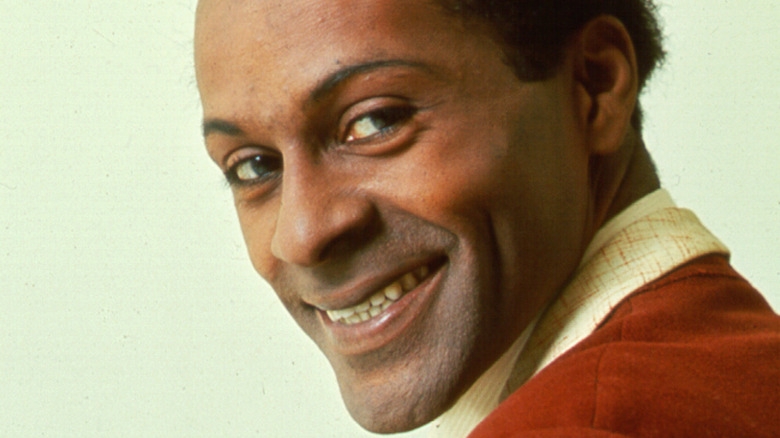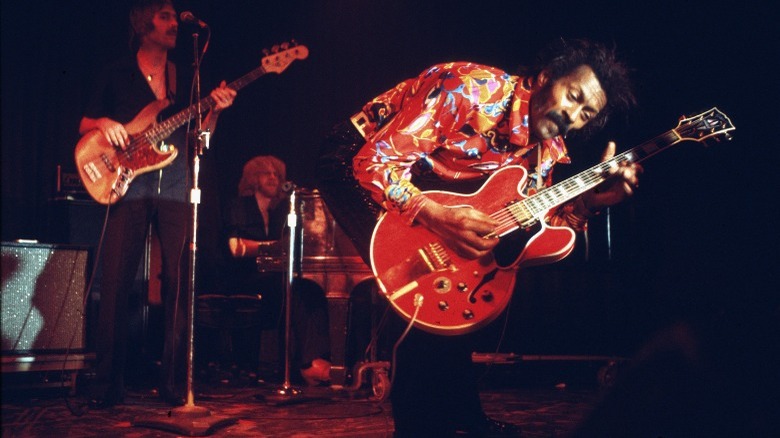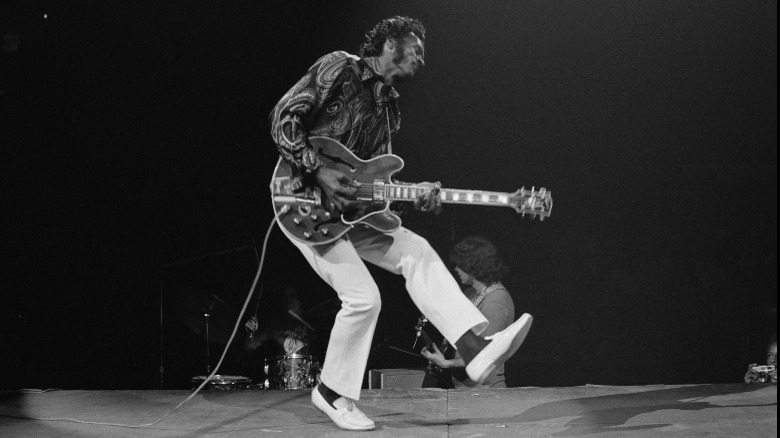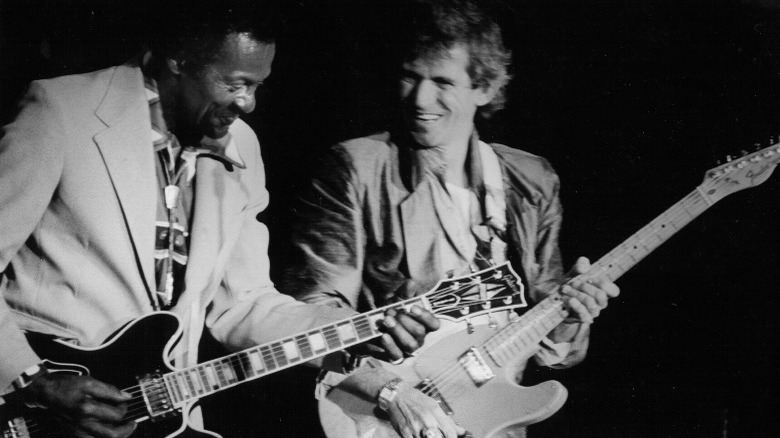The Truth About Chuck Berry's Song Johnny B. Goode
Back in 1958, Chuck Berry's most famous song only reached No. 8 on the American music charts (via The Guardian). "Johnny B. Goode" is a classic American tale of rising from poverty to wealth and fame, but it isn't just a fantasy: It's loosely based on Berry's own life.
There are some obvious differences between Berry and Johnny: Berry was from St. Louis, not Louisiana. Unlike his song character, who "never ever learned to read or write so well," Berry was educated. He had a degree in hairdressing and cosmetology, according to Rolling Stone. He was discovered by blues artist Muddy Waters while working as a beautician in St. Louis.
Nonetheless, the song is autobiographical in that Berry didn't start out rich and well-connected. It was his musical talent that helped him achieve stardom (via Rolling Stone). The "go Johnny go" chorus was inspired by his mother's encouragement of his pursuits, according to Guitar World.
Locations in the song
The places mentioned in the song each had significance for Berry, too. He wrote the song while on tour in New Orleans. He was excited to play there because he liked the idea of a black artist achieving success in a town so closely associated with slavery. He had also always wanted to visit the area after hearing the Muddy Waters lyrics "Going down to Louisiana way behind the sun" (via Guitar World). That's why Johnny B. Goode lived "deep down in Louisiana close to New Orleans."
The more specific description of Johnny's home — "way back up in the woods among the evergreens / there stood a log cabin made of earth and wood" — was based on descriptions Berry had heard of his great-grandfather's home. Berry wrote in his autobiography that he wanted to "revive that era" (via Guitar World).
His character's last name most likely came from Berry's childhood home: He grew up on Goode Street in St. Louis, per The Guardian. His first name was a tribute to pianist Johnnie Johnson, according to Guitar World. Ironically, Johnson later sued Berry, claiming he had helped write some of Berry's hit songs. The suit was dismissed (via The Guardian).
A key lyrical change
Further tying the character to himself, Berry had originally written lyrics referring to Johnny as a "colored boy," not a "country boy." Different sources give different reasons for this. Guitar World suggests he didn't want to alienate white fans by seeming "biased" towards one race. According to Rolling Stone, Berry himself said it was more about getting radio airplay, which the track might not have received with the "colored boy" lyrics.
The Guardian ties this even more specifically to the time period: the Eisenhower administration, during which racial tensions were high, and lynchings were still common in the Deep South. In that atmosphere, the original lyrics might very well have doomed the song to obscurity.
Instead, it became a rock 'n' roll classic. As famous as it is on earth, it may also be playing in outer space: Astronomer Carl Sagan chose it as one of the examples of terrestrial music sent on the Voyager 1 space probe (via Guitar World). It was the only pop song chosen to be included along with Bach, Stravinsky, and indigenous music from around the world (via Far Out Magazine).
Berry's influence and influences
Berry was the first person ever elected to the Rock & Roll Hall of Fame, and though he didn't invent the genre – Den of Geek, for one, attributes that to Ike Turner — he helped shape it. He recorded "Johnny B. Goode" at the Chess Studios in Chicago, associated with the blues, and like other rock pioneers, he adapted blues sounds into early rock 'n' roll. Some of the guitar parts in "Johnny B. Goode" were inspired by the pre-rock songs "Ain't That Just Like A Woman" by Louis Jordan (guitar played by Carl Hogan) and "Strollin' with Bones" by T-Bone Walker (via Far Out Magazine)
"Johnny B. Goode" was famously included in "Back to the Future," and though the movie ignores Berry's personal connection to the song, it's a testament to the song's long-lasting popularity (via Den of Geek). The song, and Berry himself, influenced scores of future rockers, including The Beatles, The Rolling Stones, and Eric Clapton, according to Far Out Magazine. A young Bruce Springsteen's band backed up Berry once but had trouble with his mid-song key changes. Keith Richards had more than one unpleasant run-in with Berry but revered him nonetheless. Even contemporary Elvis Presley looked up to Berry, saying he wished he could write lyrics equally well (via Rolling Stone). Though Berry died in 2017, his legacy is alive and well.



